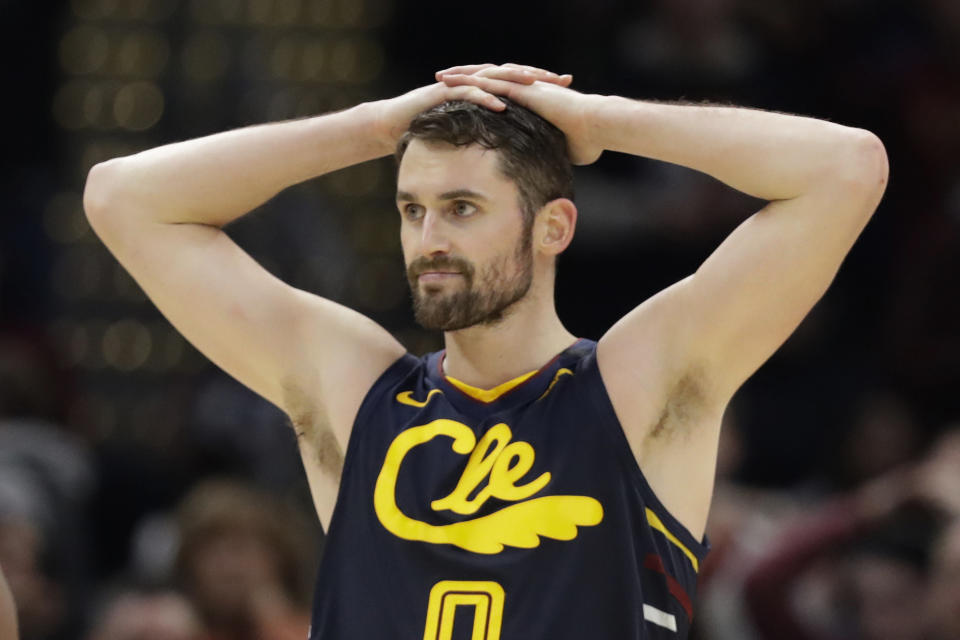Kevin Love talks mental health amid coronavirus pandemic: ‘You don’t have to suffer through it alone’
Cleveland Cavaliers forward Kevin Love has been very open about his struggles with mental health in recent years, making him one of the first NBA players in history to do so.
The COVID-19 pandemic hasn’t made that battle any better.
While Love hasn’t lost his job or a family member to the coronavirus like countless other Americans, he knows firsthand the impact the virus can have on mental health — and what can happen if people just internalize their problems and stress.
“Listen, I don't have all the answers — and likely never will,” Love said, via ESPN. “But speaking from experience, I can tell you there are resources out there that can help you.
“It's really scary what's going on in the world right now. But you don't have to suffer through it alone. Take it from someone who did that for far too long.”
Love opened up about his anxiety and panic attacks in 2018 in an article for The Players’ Tribune, and even detailed one panic attack which he had in the middle of a game. San Antonio Spurs star DeMar DeRozan shared his similar struggles just a week before Love did, too.
[ Coronavirus: How the sports world is responding to the pandemic ]
The pair were among the first in the league to speak publicly about mental health — former Iowa State star Royce White was the first, though he struggled to find a permanent home in the NBA in part because of his widely publicized general anxiety disorder and clashes with the Houston Rockets over it — and have sparked a much larger conversation about it not only in professional basketball, but in sports in general.
“My life is dramatically different [now],” Love said, via ESPN. “I have a lot more clarity about where I'm headed, and where we're headed as a society in terms of removing the stigma from mental health issues. We still treat mental illness so differently from a physical illness. If you had a heart condition, you'd see a doctor and you'd take the necessary steps to fix the problem. Why should it be any different with mental health?”

Staying in a routine
Love was one of the first players who returned to his team’s practice facility amid the coronavirus pandemic — something he said was extremely odd but also uplifting.
The Cavaliers were one of just two teams who opened their facilities earlier this month after the league eased those restrictions. Now, more than half of teams have followed suit.
“Our facility has been really odd because we have to do one guy to a basket and we have four main baskets at our facility, and everybody is in masks and gloves,” Love told Yahoo Sports. “It’s really odd to have a rebounder in a mask, in these latex gloves, throwing passes and throwing you a ball. You almost have to put that out of your mind and act like it’s not even there.
“The players are the only people not shooting with the gloves on.”
While he was away from his team, however, Love said he found it hard to establish a true routine for himself. Eventually he discovered ways to cope, like reading for an hour each night, stretching and meditating every day or working on a business project at the same time every day.
“I have to be a creature of habit,” Love said, via ESPN. “If I don't stay in my routine, then I start feeling like I'm not doing enough, or not working towards anything, and then my mind can start to spiral downward.”
Love and DeRozan aren’t the only two players in the NBA to deal with mental health issues. Far from it.
Though he knows addressing those struggles can be tough and put professional athletes in a unique and scary situation — especially now during a global pandemic — Love hopes his story, and how the Cavaliers reacted to it, can help others in the league.
“Guys don't want to reveal too much,” Love said, via ESPN. “There are so many people who still perceive this as a weakness. Players get scared if they talk about mental health, it will affect their future. They worry, ‘What does my owner think? What does my GM think? Is he going to trade me?’
“I was lucky. The Cavs have been incredibly supportive.”
More from Yahoo Sports:


